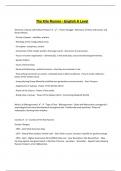The Kite Runner - English A Level
Elements of Social and Political Protest? ✔️✔️- Power Struggle - Behaviour of those with power and
those without.
- Pursuit of power - rebellion, warfare.
- Workings of the ruling political class.
- Corruption, conspiracy, control.
- Connection of the smaller world to the larger world - microcosm to macrocosm.
- Focus on human organisation - domestically, in the work place, local and national governments.
- Gender Politics
- Issues of Social Class.
- Structural Patterning - political tensions + how they are resolved or not.
- How writing comments on society - ultimately how is affects audiences + how it invites reflection -
power of the written word.
- Unquestioning Group Mentality (instilled over generations unconsciously). - Peer Pressure
- Suppression of a group. -Power of the Written Word
- Power of the Church - Power of the media.
- Ruling class or group. - Power of the Spoken Word - Contrasting Idealised Worlds
What is a Bildungsroman? ✔️✔️Type of Text - Bildungsroman - Deals with Maturation, protagonist's
psychological and moral development throughout plot. Traditionally ends positively. Theme of
redemption, learning from mistakes.
Context ✔️✔️Context of The Kite Runner:
Society Changes:
- 1933 - Zahir Shah becomes King.
- 1973 - Daoud Khan declares himself ruler - Zahir Shah's cousin. Society is hopeful for positive change.
- 1978 - April - Afghan Communist Party (PDPA) take over - Saur Revolution. Kills Daoud Khan. - May -
Uprising against new government in Nuristan Province - put down. - December - Signed treaty allowing
Russian troops to enter Afghanistan.
,- 1979 - Soviet War begins - Troops occupy major government buildings in Kabul.
- 1989 - Soviet Troops leave the country.
- 1989 - 1992 - Afghan Civil War - Soviet troops left the pro-Soviet, Communist Democratic Republic of
Afghanistan (DRA) led by Mohammad Najibullah to fend for itself against the Mujahideen (Radical
Islamists - Taliban). After several years of fighting, the government fell in 1992.
However, the mujahideen did not establish a united government, and many of the larger mujahideen
groups began to fight each other for power in Kabul. In 1994 a village mullah named Mohammed Omar
organized a new armed movement with the backing of Pakistan. This movement became known as the
Taliban ("students" in Pashto), referring to how most Taliban had grown up in refugee camps in Pakistan
during the 1980s and were taught in the Saudi-backed Wahhabi madrassas, religious schools known for
teaching a fundamentalist interpretation of Islam.
- 1995 - Taliban, tortured and killed Abdul Ali Mazari leader of the Hazara people.
- 1996-2001 - Afghan Civil War - 1996 - Taliban conquered Kabul and declared the establishment of the
Islamic Emirate of Afghanistan. Former President Mohammad Najibullah, who had been living under
United Nations protection in Kabul, was tortured, castrated and executed by Taliban forces.
- 1998 - August - Mazar-e Sharif Massacre - Taliban capture last Hazara city. - After Operation In
Hassan Rape Scene - What Page and Chapter? ✔️✔️Page 67, Chapter 7
Assef VS Amir Fight Scene - What Page and Chapter? ✔️✔️Page 264, Chapter 22
Hassan Leaving - What Page and Chapter? ✔️✔️Page 98, Chapter 9
Baba VS Russian Soldier - What Page and Chapter? ✔️✔️Page 107, Chapter 10
Stoning Scene - What Page and Chapter? ✔️✔️Page 247, Chapter 21
Sohrab - Suicide Scene - What Page and Chapter? ✔️✔️Page 314, Chapter 24
Pomegranate Scene - What Page and Chapter? ✔️✔️Page 86, Chapter 8
, Meeting with Rahim - What Page and Chapter? ✔️✔️Page 180, Chapter 15
Letter from Hassan - What Page and Chapter? ✔️✔️Page 200, Chapter 17
One-Eyed Assef Scene - What Page and Chapter? ✔️✔️Page 39, Chapter 5
Baba about Amir: "A boy who won't stand up for himself becomes a man who can't stand up for
anything" - What Page and Chapter? ✔️✔️Page 22, Chapter 4
"In the end, the world always wins. That's just the way of things" - What Page and Chapter? ✔️✔️Page
92, Chapter 8
Chapter 1 Events & Quotes ✔️✔️Chapter One
Begins in San Francisco in 2001 when the narrator is 38 years old. A phone call from an old friend, Rahim
Khan, who reminds him of "my past of unatoned sins". The narrator sees some kites flying over San
Francisco and hears Hassan's voice, "For you, a thousand times over".
Rahim says "There is a way to be good again" before hanging up. This rips open the wounds of the past
which the narrator has been trying to bury, about his life as a boy in Kabul in the 1970s and his
friendship with Hassan. His past that made him what he is today.
Chapter 2 Events & Quotes ✔️✔️Chapter Two - Page 3
OVERVIEW: INTRODUCES SETTING, HASSAN'S MOTHER, KINSHIP VS ETHNIC DIVIDE - PASHTUN &
HAZARA.
Narrator describes playing with Hassan in a tree house, playing pranks on the neighbours, like
persuading him to slingshot a dog - "Hassan never wanted to, but if I asked, really asked, he wouldn't
deny me", and getting into trouble but "he never told on me". The narrator tells us about his beautiful,
rich home and the "modest little mud hut" under the loquat tree that is the home of Ali, the servant,
(who is partially paralysed, can't smile, leg was damaged by polio) and his son Hassan. Narrator only
entered the shack in 18 years, "only a handful of times". After playing, narrator would go "past the
rosebushes to Baba's mansion, Hassan to the mud shack".
Narrator's mother died giving birth to him, Hassan's mother, Sanaubar, 1 year later gave birth to Hassan
then ran away to a clan of travelling singers and dancers - "Lost her to a fate most Afghans considered
far worse than death". Narrator "wondered if he longed to meet her" like he does for his mother, but
Hassan never talks about her. Narrator remembers going down an alley with Hassan after playing and a




